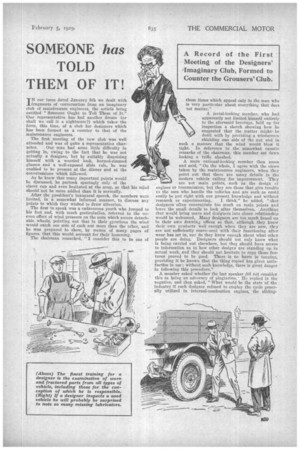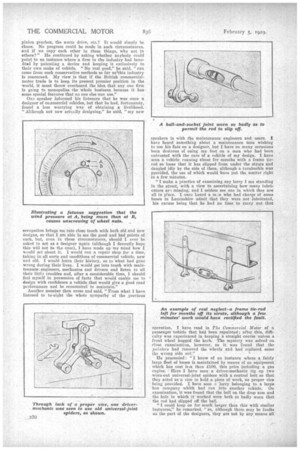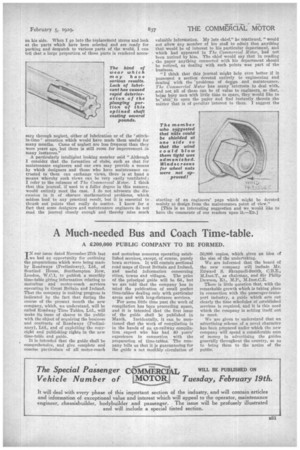SOMEONE has
Page 13

Page 14

Page 15

If you've noticed an error in this article please click here to report it so we can fix it.
TOLD THEM OF IT!
TN our issue dated January 8th we dealt with 'fragments of conversation from an imaginary club of maintenance engineers, the article being entitled "Someone Ought to Tell Them of It." Our representative has had another dream (or shall we call it a nightmare?) which takes the form, this time, of a club for designers which has been formed as a counter to that of the maintenance engineers.
The first meeting of the new club was well attended and was of quite a representative char
acter. Our man had some little difficulty in getting in, owing to the fact that he was not actually a designer, but by suitably disguising himself with a worried look, horned-rimmed glasses and a well-exposed slide rule, he was enabled to be present at the dinner and at the conversazione which followed.
As he knew that many important points would be discussed, he partook sparingly only of the claret cup and even hesitated at the soup, so that his mind should not be more addled than it is normally. After the president's inaugural speech, the members were invited, in a somewhat informal manner, to discuss any points to which they wished to draw attention.
The first to speak was a cadaverous youth who jumped to his feet and, with much gesticulation, referred to the uneven effect of wind pressure on the nuts which secure detachable wheels, pointing out that in their gyrations the wind would catch one side of each nut more than the other, and he was prepared to show, by means of many pages of figures, that this would account for their loosening. The chairman remarked, "I consider this to be one of
those items which appeal only to the man who is very particular about everything that does o t matter."
A jovial-looking member, who had apparently not limited himself entirely to the aforesaid beverage, held up for inspection a sketch showing how he suggested that the matter mightbe dealt with by providing a windscreen. shielding one side of the nut and in such a manner that the wind would blow it tight. In deference to the somewhat caustic remarks of the chairman, this member sat flown looking a trifle abashed.
A more rational-looking member then arose and said, " On the whole, I agree with the views taken by the maintenance engineers, when they point out that there are many details in the modern vehicle calling for improvement. They are not main points, such as the design et engines or transmission, but they are those that give trouble to the men -who handle the vehicles and are such as could easily be put right with our present knowledge and without research or experimenting. I think," he added, "that designers often concentrate too much on main points and leave the small details to look after themselves. Anything that would bring users and designers into closer relationship would be welcomed.. Many designers are too ranch boxed ny in their oWn drawing offices so that, although they know their own products well enough when they are new, they are not sufficiently convee sant with their functioning after wear has set in, no: do they know enough about what other people are doing. Designers should not only know what is being carried out elsewhere, but they should have access to information as to how other designs are standing up .in actual work, and they should not hesitate to copy those features proved to be good. There is no harm in copying, providing it be known that the thing copied has given satisfaction in use ; without such knowledge, there is great danger in following this procedure."
A member asked whether the last speaker did net consider this as being an advocacy of plagiarism.He replied in the negative, and then asked, "What would be the state of the industry if each designer refused to employ the cycle generally utilized in internal-combustion engines, the sliding pinion gearbox, the worm drive, etc.? It would simply be chaos. No progress could he made in such cireunistauces, Sod if we copy each other in these things, why not in others?" He continued by asking whether anybody could point to an instance where a firm in the industry had benefited' by patenting. a device and keeping it exclusively to their own make of vehicle. "No real good," he said, "can come from such conservative methods so far asithis industry Is concerned. My view is that if the British commercialmotor trade is to keep its present premier position in the world, it must throw overboard the idea that any one firm is going to monopolize the whole business because it has • some special features that na one else can use,"
One speaker informed his listeners that he was once a designer of coMmercial vehicles, but that be had, fortunately, found a less worrying Way of obtathiug a livelihood. "Although not now acter,lly designing," he said, "wy new
occupation brings me into close touch with both old end new designs, so that I am able to see the good and bad points of each, but, even in these circumstances, should I ever be asked to act as a designer again (although I devoutly hope this will not be the case), Lhave made up my mind bow I would set about it. I would run a repair shop for a time, taking in all sorts and conditions of commercial vehicle, new and old. I would learn their history, as to what had gone wrong during their lives.. I wauld get into touch with maintenance engineers, mechanics and drivers and listen to all their littls troubles and, after a considerable time, I-should feel myself in possession of facts that would enable me to design with confidence a vehicle that would give a good road performance and be economical to maintain."
Another member then arose and said, "From what I have listened to to-night the whole sympathy of the previous
speakers is with the maintenance engineers and users. I have heard something about a maintenance an wishing to use his fists on a designer, but I-have on many occasions been desirous of using my feet on a man who had been entrusted with the care of a vehicle of my design.I have seen a vehicle running about for mouths with a frame tierod so loose that it has slipped from under the Struts and dangled idly by the side of them, although a turubuckle was provided, the use of which would have put the matter right in a few minutes.
" I make a practice of examining any lorry I see standing in the street, with a view to ascertaining how many lubricaters are missing, and I seldom see one in which they are all in place. I once heard a re.in who had charge of some buses in Lancashire admit that they were not lubricated, his excuse being that he had no time to carry out that
operation. I have read in The Commercial Motor of a passenger vehicle that had been repainted ; after this, difficulty was .experienced in -keeping a straight course unless a front wheel hugged the kerb. The mystery was solved on close examination, however, as it was found that the painters had removed the wheels and had rePlaced some
the wrong side out." • . •
He proceeded : "I know of an instance where a fairly large fleet of buses is ,maintained by means of an equipment which has cost less than il(10, this price inchiding a gas engine. Here I have seen a driver-meehanic rig up two wern-out universal-joint spiders with a central bolt so that they acted as a vice to hold a piece of work, no proper vice being provided. I. have seep. a lorry belonging to a large bus company which had run into another vehicle. On examination, it was found that the ball on the drop arm and the hole in which it worked were both so badly worn that the rod had slipped off the ball.
"I could keep on for ranch longer than this with similar instances," he remarked, " so, although there may be faults on the part of the designers, they are not by any means all
on his side. When I go into the teplaceinent -stores and look at the parts Which have been selected and are ready for packing and despatch to various parts of the world, I can tell that a large proportion of those parts is rendered neces sary through neglect, either of lubrication or of the ' stitchin-time' attention which would have made them useful for many months. Cases of neglect are less frequent than they were years ago, but there is still room for improvement in many instances."
A particularly intelligent looking member said "Although I consider that the formation of clubs, such as that for maintenance engineers and our own may provide a means by which designers and these who have maintenance entrusted to them can exchange views, there is at hand a means whereby such views can be very easily ventilated ; I refer to the columns of The Commercial Motor. I think that this journal, if used to a fuller degree in this manner, would entirely meet the case. I do not advocate the discussion in it of obscene mathematical problems, which seldom lead to any practical result, but it is essential to thrash out points that really do matter. I know for a fact that some designers and maintenance engineers do not read the journal closely enough and thereby miss much
valuable inferMation. My late chief," he continued, "would not allow any member of his staff to admit that anything that would be of interest to his particular department, and which had appeared in The Commercial Motor, bad not been noticed by him. The chief would say that in reading the paper anything connected with his department Should be noticed, as dealing with such points was part of the
business. •
I think that this journal might help even better if it possessed a section devoted entirely to engineering and dealin'g with the -problems of design and maintenance. The" Commercial. Motor has many interests to deal with, and not all of these can be of value to engineers, so that, being buy men with little tithe to spare, they would like to beable7:to open the paper and find instantly therein the matter that is of peculiar interest to them. I suggest the
starting of an engineers' page which might be devoted mainly to design from the maintenance point of view." [This is an interesting suggestion and we would like to have the comments of our readers upon it.—En.]


































